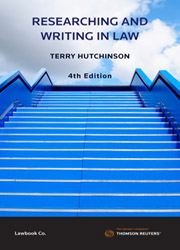Why is legal research important?
To be successful at Law School and when employed as a lawyer, you will need to be able to conduct effective and accurate legal research.
Read more at the Survive Law blog ...
Learn some tips to appreciate legal research from this short article you can download from the Legal Scholarship Network - Legal Research - The Importance of Legal Research
To learn how to effectively find and evaluate sources at university, see the online tutorial Finding and Evaluating Information on the Library's Research & Learning Online site.
Getting started with your research
The type of legal research conducted by law students facing legal problem-solving exercises is often referred to as doctrinal research. This involves identifying the relevant law and applying it to the facts of a problem before you.
Such research "provides a systematic exposition of the rules governing a particular legal category, analyses the relationship between rules, explains areas of difficulty and, perhaps, predicts future developments." (D Pearce, E Campbell and D Harding, Australian Law Schools: A Discipline Assessment for the Commonwealth Tertiary Education Commission (AGPS, 1987), vol 2, p 312.)
The following steps should be considered, although note that this is not a linear process and that you may start at different points depending on the information provided and the extent of your background knowledge in the area of research.
- Read the assignment question - pick out key facts and search terms, key cases and/or legislation, key areas of law and key jurisdictions to research.
- Check a legal dictionary to learn about legal terminology.
- Read some texts for background.
- Check loose-leaf services or reporters for commentary, cases and legislation.
- Check a legal encyclopaedia: note leading cases, and relevant legislation.
- Look at relevant legislation, check for recent or proposed amendments
- Follow up authoritative cases, identify further cases, locate and read them.
- Find journal articles for scholarly commentary on the issue or cases.
- Evaluate and consolidate the results of your research in order to formulate and write advice.
Free legal research sites
Our library guides provide you with access to both subscribed and free legal resources. See also, the lists below.
-
A Guide to Online Research Resources for the Australian Federal Legal System with some Reference to the State Level (GlobaLex)by Petal Kinder. Update: July/August 2018.
-
Researching Australian Law (LLX.com)By Nicholas Pengelley and Sue Milne, 18 Jan 2014
Primary and secondary sources
Legal information sources are divided into two distinct categories.
Primary sources are the laws created by Parliament and the Courts:
- statute law (legislation)
- case law (court judgments)
Secondary sources or Commentary provide descriptions or explanations of the law, and include;
- indexes, digests and encyclopaedias of the law
- written commentary on the law, by jurists, academics, practitioners and law reform bodies, in the form of texts, reports and journal articles. These sources give context to a legal issue and bring critical thought to the law created by our parliaments and courts.
- multimedia and social media, such as TV documentaries, podcasts, and blogs.
Top legal research books
-
Concise legal research by
ISBN: 9781862877238 -
-
-
Practical guide to legal research by
ISBN: 9780455227917 -
-
Researching and Writing in Law by
Call Number: ebookISBN: 9780455226781Publication Date: 3rd ed, 2010 -


